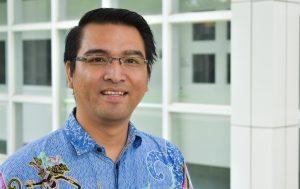Peacemaker Profile: David Dwi Chrisna Damping of Indonesia
December 29, 2018

The six students in our 2018-19 class of International Peacemaking Program fellows will spend a year at Hartford Seminary studying mediation, interfaith dialogue and public speaking while earning a Graduate Certificate.
We asked each of them to answer the same set of questions.
Q: Briefly tell us about your educational background.
A. I took my undergraduate and graduate study in my home country, Indonesia. I graduated with a B.A. in Psychology from Maranatha Christian University in Bandung, with a thesis about religious identity statuses of college students. Then I took my Master of Divinity at Southeast Asia Bible Seminary in Malang with a thesis about Christian attitudes toward religious violence using First Epistle of Peter as a model of engagement.
Q. How did you learn about Hartford Seminary’s International Peacemaking Program?
A. I knew about IPP from my friend Hans Harmakaputra, when he was in the IPP program. He told me that in the IPP we do not just get a peacemaking training but also we can take six courses in interreligious studies especially in Christian-Muslim relations from Hartford Seminary, which is exactly what I need and am looking for.
Q. Why are you interested in learning about peacemaking?
A. Most of the time people of different faiths can live peacefully and harmoniously in Indonesia, but in history, we also have witnessed how religious conflicts and violence have torn apart many regions of our country. I believe the work of peacemaking cannot be done just in one or two generations, but it is continual work that must be carried out from generation to generation. As a citizen and a Christian minister, I want to be equipped with peacemaking skills so that in turn I can equip others to be peacemakers in our generation and generations to come.
Q. How do you hope to use your skills after a year of training as a peacemaker?
A. One important lesson I get from this program is that we can not set aside differences let alone negate disagreements because in this plural world they are always present. What we need to learn is how to work through differences and disagreements for the sake of the common good. I hope I can use my skills to bring this peacemaking spirit to my country.
Q. Tell us a little about your home country and the interreligious conflict it faces.
A. Like many other countries in the world, we have a long history of living harmoniously between people of different faiths, but unfortunately, we also have the burden of the history of religious conflict and rivalry. From my experiences, I see that religious tensions are always present in all levels of the society. There is fear of Christianization and Islamization in the society and this fear can turn into suspicion, hate and even violence in the name of God.
Q. Give us a quick description of your home life and any interesting facts about yourself!
A. I was born and raised in an interreligious family. Most of my father’s family are Christians and most of my mother’s family are Muslims. There were tensions and disagreements from both sides of the family concerning the religious issues, but now we live in harmony and respect despite those disagreements.
In my leisure time, I like to read, listen to soft music and have a cup of coffee.
Join our mailing list
Keep up with all the latest happenings at Hartford International.

